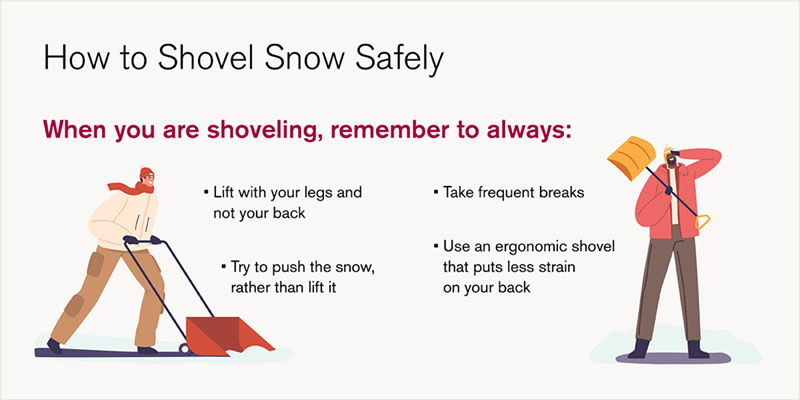 By Aaron Lee, DO, Orthopaedics, Sports Medicine
By Aaron Lee, DO, Orthopaedics, Sports Medicine
Chicago winters see an average snowfall of 30+ inches in a given season with other areas of the Midwest seeing even more snow.
As a result, many of us are outdoors during these cold winter mornings and/or evenings on one or more occassions clearing sidewalks, paths and driveways to create safe walkways for ourselves, our family members and our local community.
Health benefits of safe snow shoveling
Snow removal is strenuous work. Studies have shown that ten minutes of snow shoveling is equal to ten minutes on the treadmill. Physical exertion in the cold weather can lead to faster exhaustion and increased strain on your heart and blood pressure if you aren’t careful.
Make sure you are healthy enough for this level of exercise – if you're not sure, one of our physicians can help you make that decision.
How to prepare to shovel snow
Before you begin to shovel snow, make sure to wear enough layers to keep you dry and warm, while covering exposed skin. Covering your extremities will decrease your risk for hypothermia or frostbite and keeping your clothes dry is important because wet clothes can increase the risk of hyphothermia. Wet clothes can reduce the insulating value by almost 90%, drawing heat away from the body.
It's also important to:
- Drink plenty of water
- Warm up before getting started by taking a short walk or stretching your muscles
- Avoid caffeine, alcohol or a big meal before working as they all lead to increased blood pressure and strain on your heart

Common snow shoveling injuries and health risks
Common injuries from snow removal include lacerations, lower back pain, frostbite, hypothermia and cardiac events. If at any point you experience pain or numbness, seek medical care at one of our immediate care locations.
If you have a chronic condition or have increased risk for a heart attack or stroke, make sure to employ proper technique and take frequent breaks while shoveling snow. Don’t overdo it.
Know that if you have previously experienced a heart attack or stroke, it may be best to enlist help from a friend or neighbor rather than doing it yourself. Take precautions when necessary.
If you notice any of the following symptoms, you should seek help immediately:
- Any numbness or tingling in any parts of your body
- Chills or fever
- Pain in your lower back
- Pain radiating down your left arm or up to your jaw
- Chest pain or pressure
- Light-headedness
- Heart palpitations
- Irregular heart rhythm
Snow shoveling can be a great way to fit in some moderate exercise. If you employ proper snow shoveling techniques and follow these helpful tips, you’ll be able to help keep not only yourself, but also your family and your community safe and healthy from the wintery conditions.
Aaron Lee, DO, is a Loyola Medicine sports medicine specialist whose clinical interests include ankle injuries, elbow injuries, hip injuries, knee injuries, meniscus tears, plantar fasciitis, shoulder injuries and sports-related concussions.
Dr. Lee received his medical degree from Des Moines University. He completed a residency at Advocate Health Care and completed a fellowship at Advocate Lutheran General Hospital.
Book an appointment today to see Dr. Lee or another Loyola specialist by self-scheduling an in-person or virtual appointment using myLoyola.

